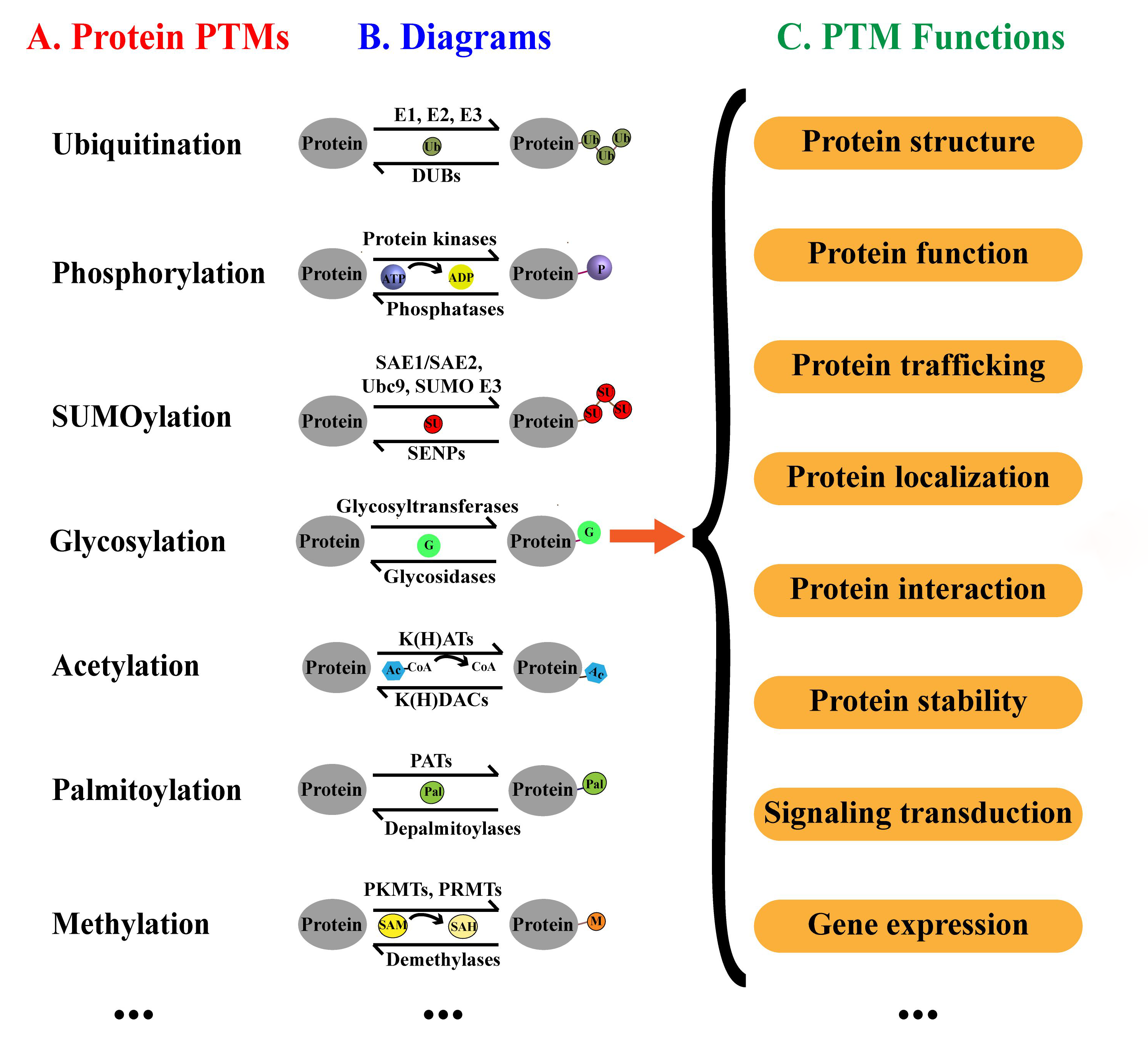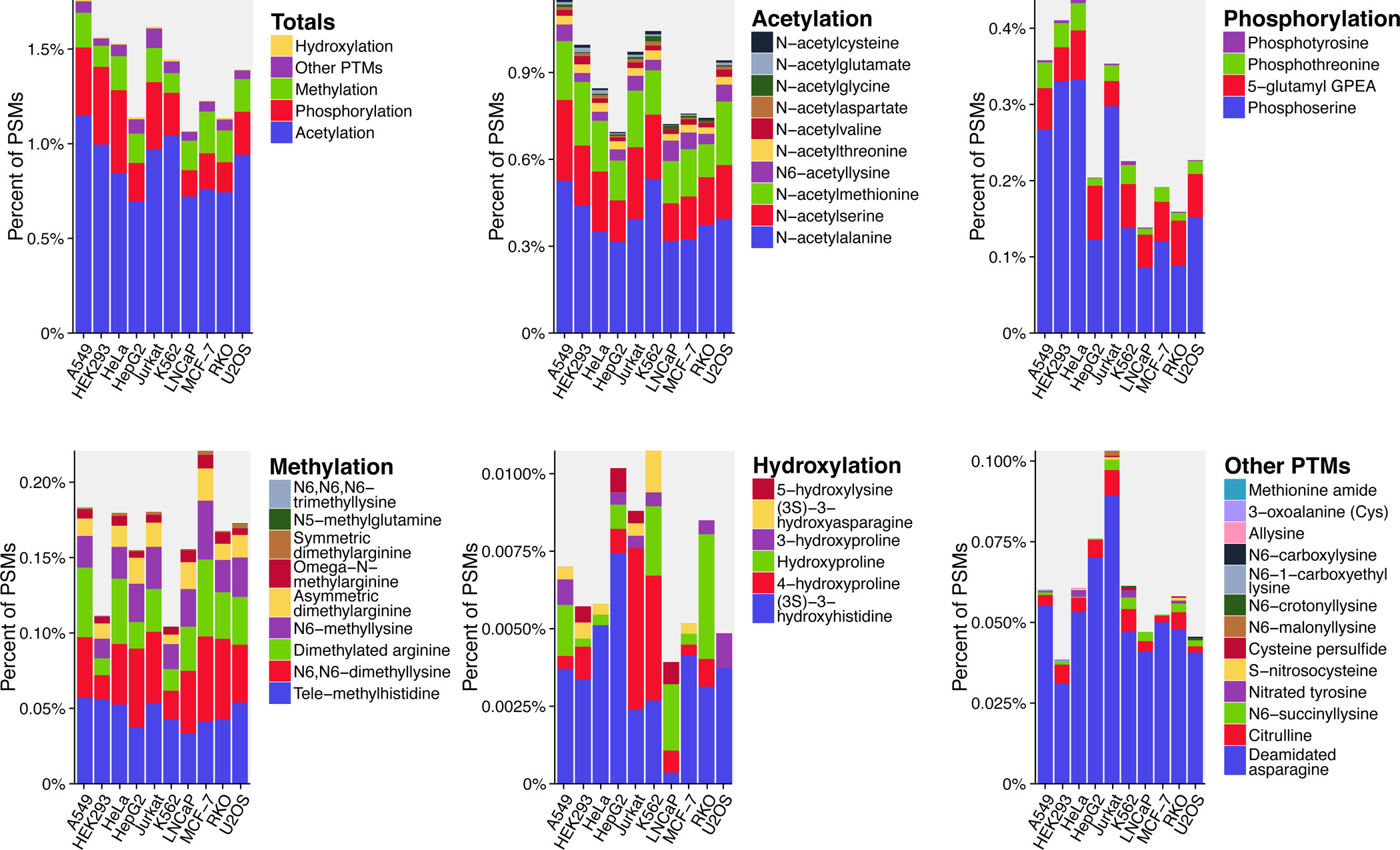Global Post-Translational Modification Proteomics Service
Global post-translational modification proteomics analysis is a high-throughput analytical technology designed to systematically study protein post-translational modifications (PTMs). It aims to comprehensively identify and quantify multiple types of protein modifications, including phosphorylation, acetylation, methylation, ubiquitination, glycosylation, and hydroxybutyrylation. PTMs play a crucial role in regulating protein function, signal transduction, metabolic processes, and disease progression. This technology relies on high-resolution liquid chromatography-mass spectrometry (LC-MS/MS), combined with specific modification enrichment strategies and bioinformatics analysis, to achieve precise identification of modification sites and dynamic profiling.
Global post-translational modification proteomics service is widely applied in oncology, neurodegenerative diseases, metabolic regulation, immunology, and drug development. For example, in cancer research, this analysis can reveal modification changes in key signaling pathways, facilitating the development of novel targeted therapies. In neuroscience, it enables the exploration of abnormal protein modification patterns associated with diseases such as Alzheimer's. Additionally, this service provides powerful technical support for precision medicine, biomarker discovery, and new drug target identification.

Zhu, Q G. et al. Frontiers in Oncology, 2024.
Figure 1. Protein PTMs and Biological Functions.
Services at MtoZ Biolabs
Utilizing a high-resolution liquid chromatography-mass spectrometry (LC-MS/MS) platform, combined with specific modification enrichment techniques and advanced bioinformatics analysis, MtoZ Biolabs provides advanced global post-translational modification proteomics service that enables precise identification and quantitative analysis of multiple protein post-translational modifications (PTMs). This service covers a wide range of modifications, including phosphorylation, acetylation, methylation, ubiquitination, glycosylation, and hydroxybutyrylation, ensuring high sensitivity and extensive data coverage.
Analysis Workflow
1. Sample Preparation
Total protein is extracted from cell, tissue, or biofluid samples and enzymatically digested to generate high-quality peptides for subsequent analysis.
2. Specific Enrichment
Targeted post-translational modifications (PTMs), such as phosphorylation, acetylation, methylation, and ubiquitination, are selectively captured using antibody enrichment, affinity labeling, or chemical derivatization strategies, enhancing detection sensitivity.
3. Mass Spectrometry Analysis
High-resolution liquid chromatography-mass spectrometry (LC-MS/MS) is employed for high-throughput identification and quantification of enriched modified peptides, ensuring data accuracy and comprehensive coverage.
4. Bioinformatics Analysis
Specialized software is used to identify and quantify modification sites, integrating functional enrichment and pathway analysis to explore the biological roles of post-translational modifications (PTMs).
5. Results Reporting and Interpretation
A comprehensive data report is provided, including modification site information, changes in modification levels, functional annotations, and potential regulatory mechanisms, offering reliable data support for biological research, disease mechanism studies, and drug discovery.

Figure 2. The Workflow of the Global Post-Translational Modification Proteomics Analysis.
Service Advantages
1. High-Throughput Multi-Modification Detection
Utilizing advanced LC-MS/MS platforms, this service enables simultaneous analysis of multiple post-translational modifications (PTMs), including phosphorylation, acetylation, methylation, ubiquitination, glycosylation, and hydroxybutyrylation, providing comprehensive modification profiling.
2. High Sensitivity and Extensive Coverage
By integrating specific enrichment strategies with high-resolution mass spectrometry, this service ensures precise identification of low-abundance modified proteins, enhancing modification site detection coverage while maintaining data accuracy and reliability.
3. In-Depth Data Analysis
Utilizing advanced bioinformatics tools, this service performs modification site identification, quantitative analysis, functional enrichment, and pathway analysis to uncover the roles of post-translational modifications in biological functions and disease mechanisms.
4. Customized Experimental Solutions
Tailored to meet specific research needs, this service offers flexible experimental designs, including screening for different modification types, quantitative analysis of specific modified proteins, and personalized data mining, supporting disease research, drug development, and precision medicine.
Applications
1. Cancer Research
The global post-translational modification proteomics service can reveal key regulatory mechanisms driving tumor initiation, progression, and drug resistance, providing new targets for early cancer diagnosis and targeted therapy.
2. Metabolic Disease Research
This service investigates the role of post-translational modifications in diabetes, obesity, and other metabolic disorders, analyzing modification patterns in metabolic pathways to identify potential biomarkers and therapeutic targets.
3. Neurodegenerative Disease Research
The global post-translational modification proteomics service enables the analysis of proteins associated with neurodegenerative diseases such as Alzheimer’s and Parkinson’s disease, exploring how modifications affect protein aggregation, synaptic plasticity, and neuronal signaling to support disease mechanism studies and drug development.
4. Immune and Infectious Disease Research
This service investigates the modification patterns of key proteins in immune signaling pathways, analyzing the role of post-translational modifications in inflammation, viral infections (e.g., COVID-19), and autoimmune diseases, driving the development of novel immunotherapy strategies.
5. Drug Discovery and Precision Medicine
The global post-translational modification proteomics service can assess the impact of drug candidates on protein modifications, identify potential biomarkers, and optimize drug mechanisms, providing critical data for precision medicine and accelerating targeted drug development.
Case Study
1. Human Proteomic Variation Revealed by Combining RNA-Seq Proteogenomics and Global Post-Translational Modification (G-PTM) Search Strategy
The study aimed to systematically analyze the variability of human post-translational modifications (PTMs) using the Global Post-Translational Modification (G-PTM) strategy combined with RNA-Seq proteogenomics. Human cell and tissue samples were examined using high-resolution mass spectrometry (LC-MS/MS) in conjunction with the G-PTM search approach to comprehensively identify and characterize protein modifications and their biological context-dependent variations. The results demonstrated that this method efficiently detected multiple PTM types, including phosphorylation, acetylation, methylation, and glycosylation, while uncovering numerous novel modification sites, particularly in non-canonical protein regions. Further analysis revealed that dynamic changes in different PTM combinations play crucial roles in signaling pathway regulation, protein interactions, and cellular functions. The study concluded that the G-PTM strategy significantly enhances the breadth and depth of PTM detection, providing a powerful tool for systematic PTM research and advancing precision medicine, biomarker discovery, and targeted therapy development.

Cesnik, A J. et al. Journal of Proteome Research, 2015.
Figure 3. Many Types of PTMs were Revealed by the G-PTM Search Strategy.
Deliverables
1. Comprehensive Experimental Details
2. Materials, Instruments, and Methods
3. Data Analysis, Preprocessing, and Estimation
4. Bioinformatics Analysis
5. Raw Data Files
MtoZ Biolabs, an integrated Chromatography and Mass Spectrometry (MS) Services Provider, provides advanced proteomics, metabolomics, and biopharmaceutical analysis services to researchers in biochemistry, biotechnology, and biopharmaceutical fields. Our ultimate aim is to provide more rapid, high-throughput, and cost-effective analysis, with exceptional data quality and minimal sample consumption. Free project evaluation, welcome to learn more details!
MtoZ Biolabs, an integrated chromatography and mass spectrometry (MS) services provider.
Related Services
Histone Post-Translational Modification (PTM) Proteomics Service
How to order?







